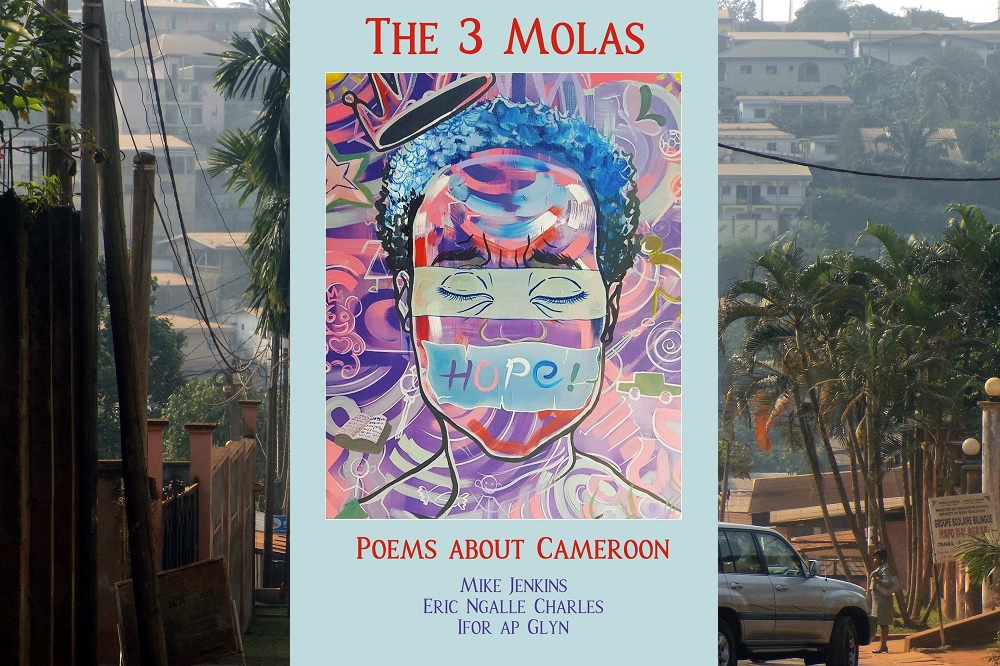Review: The 3 Molas builds a Bendigeidfran-sized bridge between Wales and Cameroon

Jon Gower
Bridge-building is mentioned more than once in this collection, so these poems, produced on a two-week visit to the divided country of Cameroon, can be seen as struts and stanchions, beams and abutments. They all help create an architecture of understanding, a remarkably tensile way of linking two disparate countries.
Conjoined in their shared humanity the poems talk chattily to each other, exporting and bartering words from Welsh, Bakweri, Pidgin and English, all adding up a linguistic froth as tasty as Eric Ngalle Charles’ beloved soups such as banga, or palm nut and the gloriously yellow achu soup.
When the trio visited Africa in October 2018 the political situation was fracturing, and a civil war was splintering the country along linguistic lines. Historically the country had been arbitrarily divided into a substantial French speaking area, covering four-fifths of the landmass and the rest run by the British, and therefore English speaking.
In a very useful introduction by Professor Joyce Ash, who traces the way these divisions became fault lines and eventually demarcations for a civil war, we can see how the current armed conflict has roots that go back to the takeover by France and Britain after Germany lost sway after World War I. It’s a backdrop to the visit, yet the poems themselves are shot through with friendship, cultural exchange and linguistic openness.
Thunder
Not that their experiences were all edifying. They witnessed the death of an okada, or unlicenced motorcyclist, who was crushed by a runaway lorry, whose driver fled the summary court of enraged passers-by who would use their machetes in an act of ‘blood justice.’ As Mike Jenkins snapshots the moment
on this very road a juggernaut
full of tree-trunks juts out
close to trees heavy with fruit,
our breath suddenly sawed so we fall
like the man into the ditch
Although these are far from tourist snaps Jenkins’ verses add up to a busy, kinetic picture of life, with women clapping and singing in the markets among stalls of vegetables and fruit, the ‘foot traders selling everything/from bitter cola to windscreen-wipers,’ not to mention, suffocatingly, ‘a man crammed into a car boot.’
On a visit to Yaoundé Zoo the Merthyr poet meets a maniacal macaque monkey which growls like thunder behind the fences of its enclosure, where it ‘bares his dagger teeth.’ But Jenkins knows better than to venture too far out east, to the land of the Rhinoceros Viper, a monster of a species, and ‘daily danger.’
For Eric Charles, this visit is a homecoming, of course, so his contributions are laden with sadness at the present situation, so that he laments ‘Beneath the shattered wall of Buea’s blood,’ Buea being the area where he grew up. He sees Ndondondume, the mythical beast stalking the land, sowing dissent and violence.
It isn’t safe for the three of them to visit Eric’s home village of Small Soppo, so for the launch of an anthology of poems from Wales and Cameroon – the ostensible reason for the visit – his mother, pragmatically, and in a great show of defiant spirit brings the whole family to Yaoundé, the political capital.
Ifor ap Glyn, a poet who takes his notebook everywhere he goes, closes the collection with poems in Welsh, along with their tandem translations which variously give thanks to the hotel owners and the drivers. To his fellow poet Iya Efeti he offers a cywydd, a poem of thanks in exchange for a vividly coloured shirt. On a visit to Maison de Radio, Cameroon’s main radio station, our National Poet encounters a rather run-down place, ‘where metal doors/hang drunk on their hinges;/where pipes and stains/force through the ceilings;/where wiring loops lazily/along the walls,/as if inviting/the drying of clothes…’
Pride
Despite this manifest dereliction they are there to record a programme with Charles Tembei, who broadcasts a regular programme of literary news to his many listeners. Like Tembei’s output this bright and sparky collection, though tinged with the sad sounds of faraway fighting is a sort of bulletin.
It brings the latest news of a fine bridge being built, linking Cymru with Camerŵn, with Eric Ngalle Charles perhaps acting as a modern Bendigeidfran, the king embedded in the simple old saw, ‘A fo ben bid bont,’ which roughly translates as ‘he who would be a leader must first be a bridge.’
And next to him stand his fellow engineers of verse, his two molas, friends and comrades, looking with pride at their simple but continent-spanning feat. Or, as the closing stanza of Charles’ ‘My Favourite Foods’ has it
On the third night,
As the sun drifts
As the moon shows its face,
We shall hold hands
I will chant in Sufi mystics,
as slowly, we disappear behind the hills of Treorci.
Support our Nation today
For the price of a cup of coffee a month you can help us create an independent, not-for-profit, national news service for the people of Wales, by the people of Wales.






